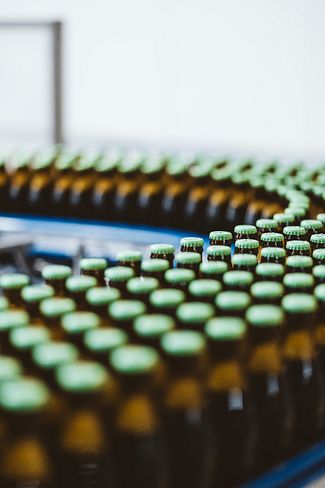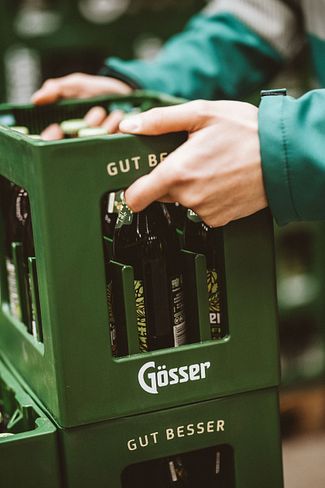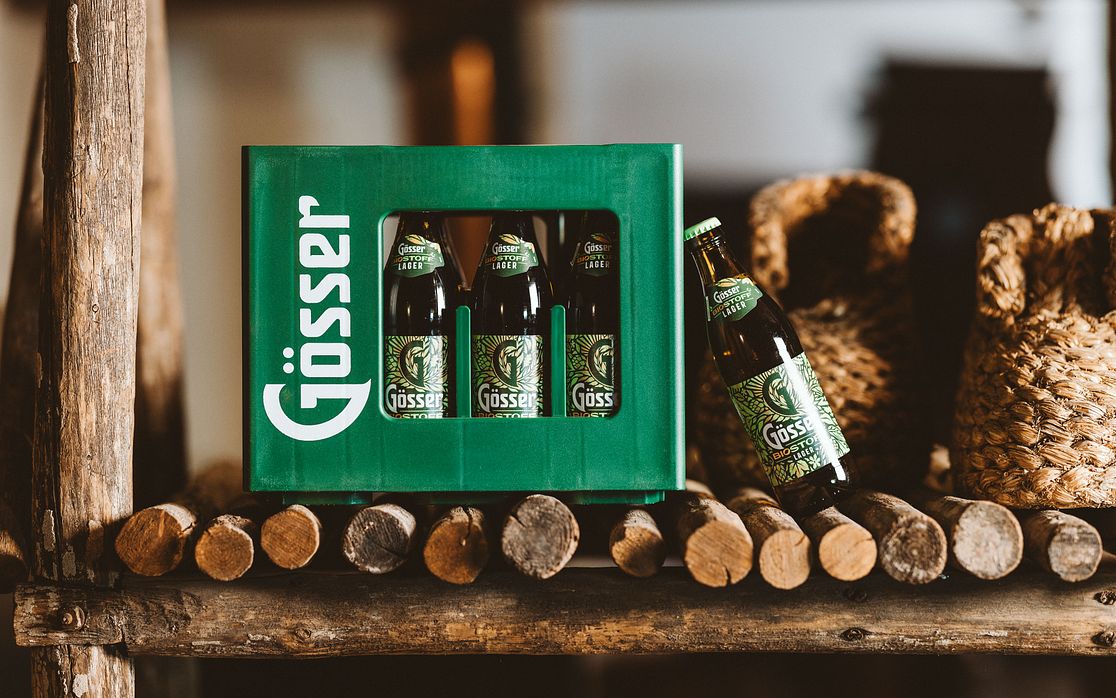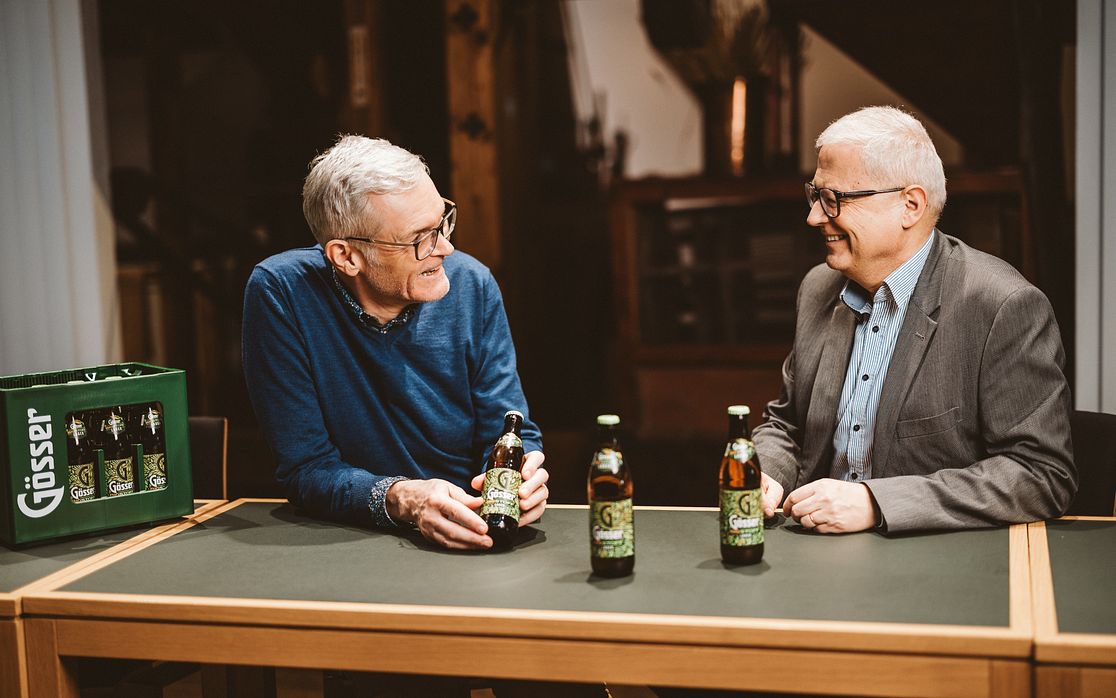Gösser
03/2024: ‘Organic is what matters now’ – that’s a rough translation of the slogan used by Austria’s Gösser brewery to promote its first organic beer. The Gösser brand can look back on a long and rich tradition – and now, its Gösser Biostoff Lager is set to enter a growing market. The new beer comes with an appropriate sustainable brand identity thanks to 0.33-litre returnable bottles produced with Vetropack’s innovative Echovai technology, together with a new crate design.
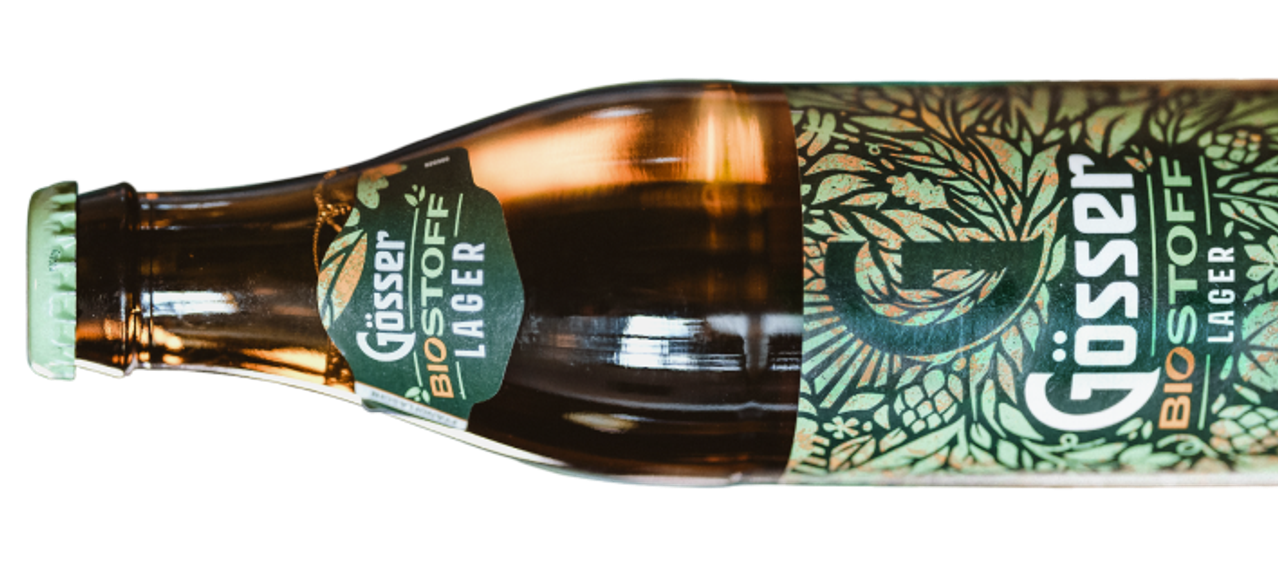
More modern – fresher – and younger: Gösser Biostoff Lager aims to be exactly the beer that growing numbers of consumers want to drink. According to GfK (the Society for Consumer Research), no less than 60 percent of Austria’s beer drinkers feel that the existing choice of organic beers is not adequate. Teresa Höfler, Senior Brand Manager at Brau Union, comments: “That comes as no surprise to us. Generation Z in particular – consumers aged between 20 and 28 – are self-critical as regards their consumption habits, and they focus on sustainability. And the picture is similar for members of Generation Y, who place more emphasis on enjoyment: they see mindful consumption as an intrinsic aspect of their own attitude. At the same time, purchasers in this segment like to try out new products that fit with their modern lifestyle.”
As an innovative beer brand, Gösser therefore intends to do all the more to satisfy these market requirements going forward. From the earliest days, Gösser has always firmly believed that its beer is not only the best from nature – but also the best for nature. The brand’s roots go all the way back to the year 1000, when Countess Adula founded a convent where the nuns brewed beer – a customary practice at that time. In 1860, Max Kober revived the old monastic brewery in the Styrian town of Leoben, laying the foundations for Gösser’s breathtaking development into the largest beer brand in the Alpine republic.
Nowadays, Gösser is part of Brau Union Österreich, which in turn has belonged to the Heineken Group since 2003. The brewery sets great store by using high-quality ingredients and adhering to traditional brewing methods. This has enabled the company to achieve what only a few others have managed to do: it combines the traditional with the modern, and has always continued to develop while safeguarding its roots. Gösser is taking the next step along this path with its new organic beer.
Organic beer in an innovative returnable bottle – with Echovai technology by Vetropack
“The new product’s appearance also reflects this step,” Höfler explains. “One of Gösser Biostoff Lager’s most convincing attributes is its unique recipe. With its vibrant golden-yellow colour and fine aromatic malt tones, it is excitingly tangy and drinkable. Made from 100 percent Austrian organic raw materials, this beer combines sustainability with enjoyment in an innovative 0.33-litre returnable bottle.” As she points out, Gösser Biostoff Lager is being launched on the market in the new lightweight returnable standard bottle which, at the same time, plays its part in helping to achieve the refill quota that has been mandatory in Austria since 2024. The bottle was produced with Echovai technology from Vetropack, the Swiss glass packaging manufacturer. The trailblazing Echovai process involves thermal tempering of the glass bottles to make them exceptionally resilient – as well as reducing their weight. “This technology opens the way for efficient production of more robust standard bottles that are also lighter in weight. They are ideal for use as returnable containers thanks to their many convincing advantages – they score high on sustainability, convenience, stability and simpler logistics,” says Erich Jaquemar, Strategic Account Manager for Vetropack in Austria.
These attributes make the bottle ideal for conveying the brand essence of the new organic beer. “Sustainability is at the core of the Gösser brand, which hails from the green countryside of Styria”, Höfler notes. “For example, we brew Gösser beer with renewable energy from our in-house biogas plant, and we already began using recycled paper for the labels a long time ago. A standard returnable bottle solution now offers a comfortable alternative to the established non-returnable containers – and this opens up huge opportunities to become even more sustainable.”
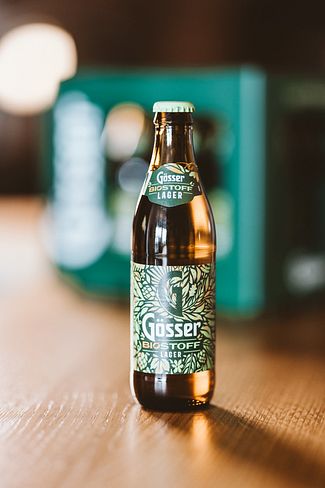
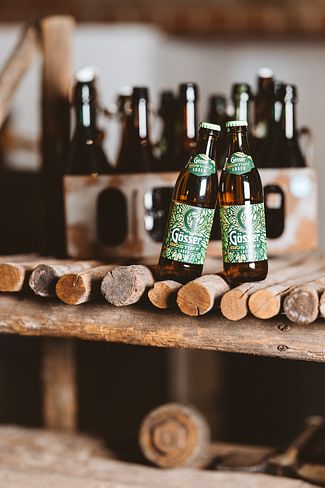
«Made from 100 percent Austrian organic raw materials, this beer combines sustainability with enjoyment in an innovative 0.33-litre returnable bottle.»
The idea of a returnable standard bottle for joint use by various breweries has already been around for a long time on the Austrian beer market. But as the issue of sustainability gained importance for consumers, pressure grew to turn the idea into reality. This raised the question as to which bottle would be suitable. Brau Union Österreich has already been collaborating with Vetropack for many years. “As far as glass packaging is concerned, Vetropack is a reliable partner,” according to Dietmar Roher, Quality Expert at Brau Union. So naturally, great interest was aroused when Vetropack learned of the search for a suitable returnable bottle and presented the new Echovai technology to Brau Union.
Standard returnable bottle is a milestone for Austria
“Of course, the aim was to find a solution that other breweries could also accept,” Roher continues. A working group set up within the Austrian logistics association for reusable packaging (Logistikverbund Mehrweg) has been focusing on the technical feasibility of the future system. The shape of the bottle had to meet several requirements: it had to be suitable for people to insert in standard reverse vending machines (RVMs); the product needed to be identifiable as a returnable bottle, and it also had to be suitable for a variety of crate formats. “The trade, the brewing industry and the service providers then reached agreement on a 0.33-litre returnable bottle. This marked a milestone for the Austrian beer market,” Roher sums up. Other countries already have a standard solution in place for parts of the returnable system – and Austria can now make up some ground here.
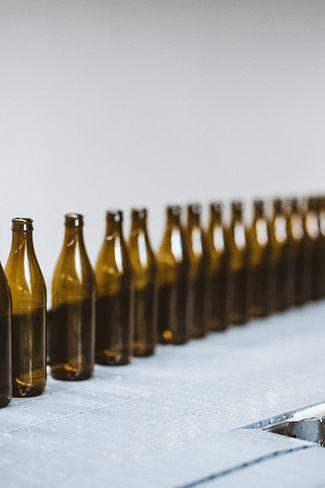
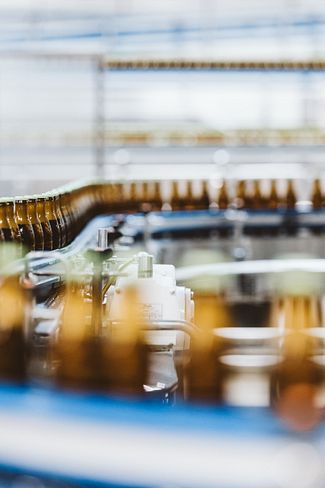
30 percent lighter – and CO2 emissions cut to one quarter
The 0.33-litre returnable standard bottle was developed in collaboration with Vetropack. It is a convincing innovation in many different respects: at 210 grams, the bottle weighs 30 percent less than conventional standard bottles. Less weight means easier handling and fewer CO2 emissions. “Our development work didn’t only focus on the individual bottle – we also considered reusable packaging as a system”, says Jaquemar. “What that means is that the designs of the bottles and crates, as well as the pallets and the logistics, are all coordinated with one another. Six rows of crates can be transported on each pallet instead of five in the past.” One standard pallet therefore has enough room for 96 crates. Overall CO2 emissions are reduced to as little as one quarter in comparison to conventional non-returnable containers. This is due not only to savings on logistics, but also to the high share of recycled glass in raw glass production.
At the same time, extensive tests have proven the standard bottle’s stability. “Because there is less wear on the contact surfaces, the re-usage rate is about 20 percent higher than for conventional containers. The bottle is stable – so the advantages it offers aren’t just ecological,” Jaquemar continues. Safety, for instance, was another aspect where Brau Union benefited from a special Vetropack service to optimise the line.
Measuring impact
As well as supporting Brau Union with development of the bottle solution, Vetropack then helped to integrate the solution into the processes. To identify potential danger points, Vetropack’s technical service performed an impact test on all Brau Union’s bottling lines that would be used to fill the new bottles in future. The ShockQC in-line sensor from Masitek was deployed for this purpose. It measures the forces and loads acting on a glass container with maximum precision. “This sensor makes it possible to detect all the impacts that the bottles are exposed to during filling, so corrective action can be taken where appropriate.” In this way, potential problems can already be eliminated before production starts, and line stoppages that cost time and money can be avoided. Roher again: “We now have an accurate overview of which forces and impacts act on the bottles, and where – from depalletising to repackaging – and we’re aiming to keep on reducing these stresses.”
Bottling of the new Gösser Biostoff Lager already began some time ago. The new organic beer first appeared on the market back in mid-February – as the first Austrian beer to be available in the innovative standard bottles, delivered in practical 12-bottle crates. More brands are set to adopt Vetropack’s lightweight bottle in the near future. And meanwhile, Gösser is responding to the requirements of young consumers in particular – by offering a modern, organic beer in a new sustainable packaging.
